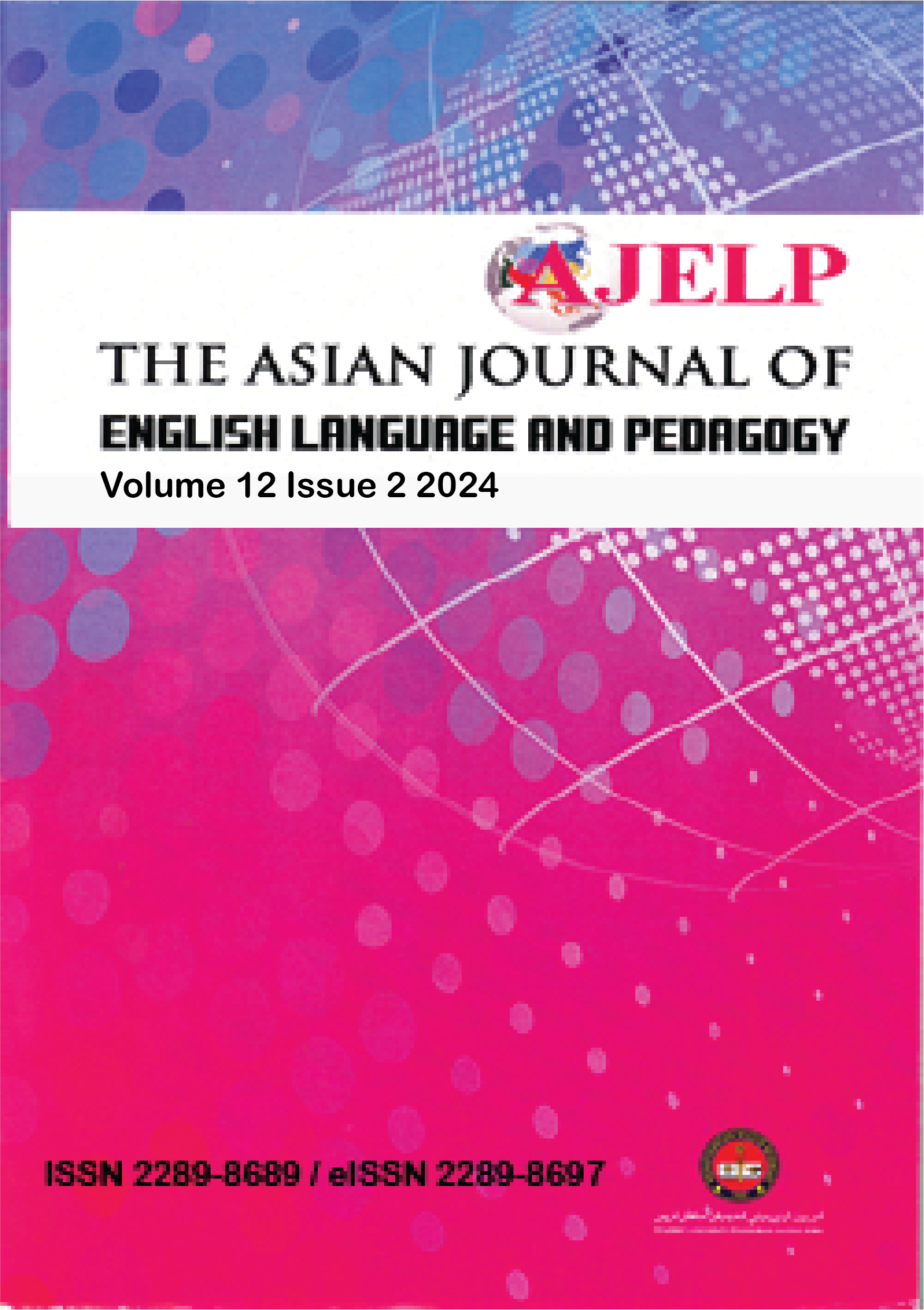The future of lesson planning: AI integration experiences among TESL teacher trainees in a Malaysian public university
DOI:
https://doi.org/10.37134/ajelp.vol12.2.13.2024Keywords:
Artificial Intelligence, chatGPT, magic school AIAbstract
This study examines TESL students’ perceptions of the incorporation of Artificial Intelligence into lesson planning. This study also identifies the AI tools selected by TESL teacher trainees for lesson plan development. This study involved thirty TESL undergraduate students and five teacher trainees from a Malaysian public university. This research employed a descriptive case study methodology, incorporating semi-structured interviews with teacher trainees and a questionnaire administered to TESL students. The data gather from interviews were transcribed and analysed thematically, while the questionnaire data were tabulated. The research findings have clear implications for participants who conveyed favourable views on AI integration in lesson planning. Two themes emerged from the interview: the Utilization of Diverse AI Tools and the Customization and Adaptation of AI-Generated Content. Significantly, ChatGPT and Magic School AI emerged as favoured selections among the participants. These findings substantially enhance the efficiency of lesson planning, accelerate idea generation, and simplify the overall process. This study suggests that educational practitioners must adopt artificial intelligence (AI) in lesson plan development, given its increasing acceptance and advantages.
Downloads
References
Ahmad, S., Alam, M., Rahmat, M., Mubarik, M., & Hyder, S. (2022). Academic and administrative role of artificial intelligence in education. Sustainability. https://doi.org/10.3390/su14031101.
Alali, R., Wardat, Y., Al-Saud, K., & Alhayek, K. (2024). Generative AI in education: Best practices for successful implementation. International Journal of Religion. https://doi.org/10.61707/pkwb8402.
Alshumaimeri, Y., & Alshememry, A. (2024). The extent of ai applications in efl learning and teaching. IEEE Transactions on Learning Technologies, 17, 653-663. https://doi.org/10.1109/TLT.2023.3322128.
Boneva, R., & Garov, K. (2024). Introduction to artificial intelligence and its application in creating lesson plans. Education and Technologies Journal. https://doi.org/10.26883/2010.242.6200
Cano, C., & Troya, A. (2023). Artificial intelligence applied to teaching and learning processes. LatIA. https://doi.org/10.62486/latia20232.
Cantos, K., Giler, R., & Magayanes, I. (2023). Artificial intelligence in language teaching and learning. Ciencia Latina Revista Científica Multidisciplinar. https://doi.org/10.37811/cl_rcm.v7i4.7368.
Crescenzi-Lanna, L. (2022). Literature review of the reciprocal value of artificial and human intelligence in early childhood education. Journal of Research on Technology in Education, 55, 21 - 33. https://doi.org/10.1080/15391523.2022.2128480.
Da Silva, G., & Ulbricht, V. (2023). Chatgpt and bard in education: A comparative review. In proceedings of the 20th international conference on cognition and exploratory learning in the digital age (celda 2023) (pp. xx-xx). https://doi.org/10.33965/celda2023_202306l045
Ejjami, R. (2024). The future of learning: AI-Based curriculum development. International Journal For Multidisciplinary Research. https://doi.org/10.36948/ijfmr.2024.v06i04.24441.
Ifenthaler, D., & Schumacher, C. (2023). Reciprocal issues of artificial and human intelligence in education. Journal of Research on Technology in Education, 55, 1 - 6. https://doi.org/10.1080/15391523.2022.2154511.
Kehoe, F. (2023). Leveraging generative ai tools for enhanced lesson planning in initial teacher education at post primary. Irish Journal of Technology Enhanced Learning. https://doi.org/10.22554/ijtel.v7i2.124.
Kshirsagar, P., Jagannadham, D., Alqahtani, H., Naveed, Q., Islam, S., Thangamani, M., & Dejene, M. (2022). Human intelligence analysis through perception of ai in teaching and learning. Computational Intelligence and Neuroscience, 2022. https://doi.org/10.1155/2022/9160727.
Lee, G., & Zhai, X. (2024). Using chatGPT for science learning: A study on pre-service teachers' lesson planning. IEEE Transactions on Learning Technologies, 17, 1683-1700. https://doi.org/10.1109/TLT.2024.3401457.
Lee, S. (2023). Otherwise than teaching by artificial intelligence. Journal of Philosophy of Education. https://doi.org/10.1093/jopedu/qhad019.
Motlagh, N., Khajavi, M., Sharifi, A., & Ahmadi, M. (2023). The impact of artificial intelligence on the evolution of digital education: A comparative study of openai text generation tools including chatgpt, bing chat, bard, and ernie. ArXiv, abs/2309.02029. https://doi.org/10.48550/arXiv.2309.02029.
Salas-Pilco, S., Xiao, K., & Hu, X. (2022). Artificial intelligence and learning analytics in teacher education: A systematic review. Education Sciences. https://doi.org/10.3390/educsci12080569.
Tian, Y. (2024). Empowering college physical education: ai-driven training, teaching, and intelligent information processing. Molecular & Cellular Biomechanics. https://doi.org/10.62617/mcb.v21i1.327.
Van Den Berg, G., & Du Plessis, E. (2023). chatgpt and generative ai: Possibilities for its contribution to lesson planning, critical thinking and openness in teacher education. Education Sciences. https://doi.org/10.3390/educsci13100998.
Van Den Berg, G., & Du Plessis, E. (2023). Chatgpt and generative ai: Possibilities for its contribution to lesson planning, critical thinking and openness in teacher education. Education Sciences. https://doi.org/10.3390/educsci13100998.
Wangsa, K., Karim, S., Gide, E., & Elkhodr, M. (2024). A systematic review and comprehensive analysis of pioneering ai chatbot models from education to healthcare: chatgpt, bard, llama, ernie and grok. Future Internet, 16, 219. https://doi.org/10.3390/fi16070219.
Zawacki-Richter, O., Marín, V., Bond, M., & Gouverneur, F. (2019). Systematic review of research on artificial intelligence applications in higher education – where are the educators?. International Journal of Educational Technology in Higher Education, 16. https://doi.org/10.1186/s41239-019-0171-0.
Zouhri, A., & Mallahi, E. (2024). Improving teaching using artificial intelligence and augmented reality. Journal of Automation, Mobile Robotics and Intelligent Systems, 18, 57 - 61. https://doi.org/10.14313/jamris/2-2024/13.
Downloads
Published
Issue
Section
License
Copyright (c) 2024 Haddi @ Junaidi Kussin, Puteri Zarina Megat Khalid, Rizky Hafiz Chaniago, Sasigaran Moneyam, Hasnor Eilina Hassim

This work is licensed under a Creative Commons Attribution-NonCommercial-ShareAlike 4.0 International License.





